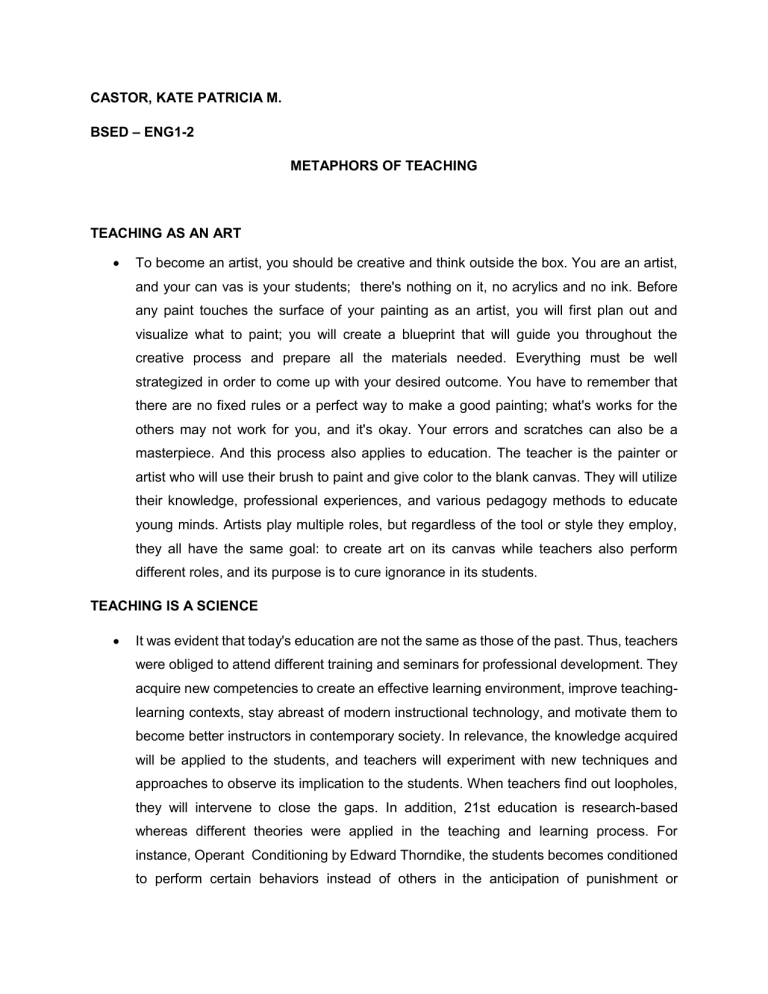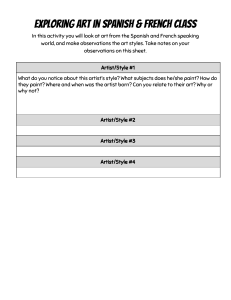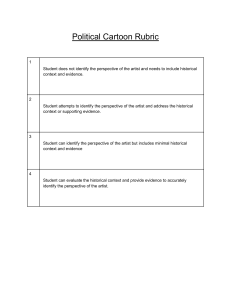
CASTOR, KATE PATRICIA M. BSED – ENG1-2 METAPHORS OF TEACHING TEACHING AS AN ART To become an artist, you should be creative and think outside the box. You are an artist, and your can vas is your students; there's nothing on it, no acrylics and no ink. Before any paint touches the surface of your painting as an artist, you will first plan out and visualize what to paint; you will create a blueprint that will guide you throughout the creative process and prepare all the materials needed. Everything must be well strategized in order to come up with your desired outcome. You have to remember that there are no fixed rules or a perfect way to make a good painting; what's works for the others may not work for you, and it's okay. Your errors and scratches can also be a masterpiece. And this process also applies to education. The teacher is the painter or artist who will use their brush to paint and give color to the blank canvas. They will utilize their knowledge, professional experiences, and various pedagogy methods to educate young minds. Artists play multiple roles, but regardless of the tool or style they employ, they all have the same goal: to create art on its canvas while teachers also perform different roles, and its purpose is to cure ignorance in its students. TEACHING IS A SCIENCE It was evident that today's education are not the same as those of the past. Thus, teachers were obliged to attend different training and seminars for professional development. They acquire new competencies to create an effective learning environment, improve teachinglearning contexts, stay abreast of modern instructional technology, and motivate them to become better instructors in contemporary society. In relevance, the knowledge acquired will be applied to the students, and teachers will experiment with new techniques and approaches to observe its implication to the students. When teachers find out loopholes, they will intervene to close the gaps. In addition, 21st education is research-based whereas different theories were applied in the teaching and learning process. For instance, Operant Conditioning by Edward Thorndike, the students becomes conditioned to perform certain behaviors instead of others in the anticipation of punishment or reward. Students can get quick feedback on their behavior by using operant conditioning. When a teacher praises good behavior, other students are more motivated to imitate it in order to get the same praise. Because of the positive feedback, the rewarded pupil is more likely to repeat the behavior. TEACHING IS A CRAFT We are studying in preparation for our dreams; we know that educating individuals is a complex task, and it doesn’t happen in just a snap. And our nearly four-year course program has prepared us to become globally competent and competitive individuals by immersing us in a new horizon in which we can grow and gain new skills that we can use for our chosen specialization. All of our skills accumulated via experience make up our craft. Learnings may cause challenges and obstacles. Still, these ups and downs, as well as the in-between, will eventually become your combat sword. TEACHING IS A MISSION When I was in junior high, my teacher often asked what my mission or purpose in life was. This question seemed effortless, but I couldn’t say a word as I began to contemplate. If a teacher asked this question again, I think I can now answer that my main mission need to accomplish is to give an antidote to ignorance. Humans are born with no built-in mental content or tabula rasa, and teachers have the power to aid this gap and fill this with knowledge and meaningful learning experiences. By doing so, I know this can be hard because this profession is something that should not be perform as an obligation or somewhat for the sake of salary. Instead, it should be done with the mission to elevate the student’s life in every domain and help them achieve life goals. TEACHING IS A VOCATION They said that teaching is a noble profession that requires perseverance, passion, determination, effort, and action. I couldn't agree more because these attributes were the main determinants to fully fulfill your purpose, roles and responsibilities. Teachers should also be a learner wherein they place themselves in the shoe of the students to understand what they are going through. "Maslow before Bloom" means that to enhance students' cognitive domain, you must first meet their needs. You cannot educate them if they are emotionally devastated. Teachers are not only a provider of knowledge, and their job does not only lie in their expertise about the subject matter. Instead, the teacher should also present genuineness, welcome individual differences, and foster inclusivity in the learning environment.


